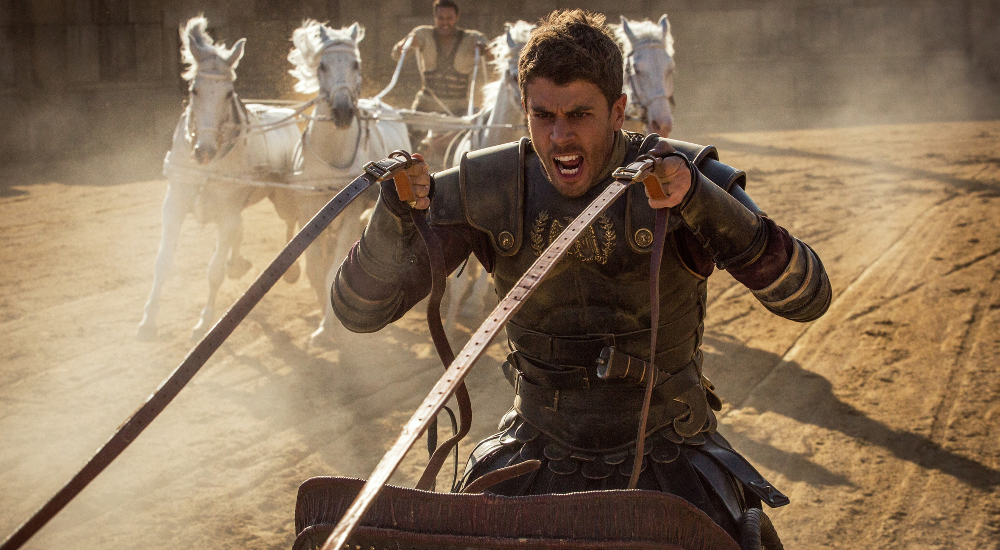If you're anything like me, you've been conditioned to feel nothing but disdain for remakes, rehashes and reboots of all kinds. When the trailer for a Ben-Hur remake landed earlier this year, I took great pleasure in rolling my eyes and shaking my first at the movie gods. But soon after Timur Bekmambetov's remake began, I realized the error of my ways. Ben-Hur succeeds as the rare good remake because it does what few remakes seem to do—stick to the original as close as possible.
The story is the same as it was in William Wyler's groundbreaking epic. Judah Ben-Hur (Jack Huston) is a Judean royal who loves wine, horse racing his brother and loving his soon-to-be wife. Said brother is the adopted Roman Mesalla, who, as played by Toby Kebbell, has the ability to go from sad puppy dog to rabid Rottweiler in mere seconds.
Restless in a home that was never truly his, Mesalla leaves Judea to join his countrymen in their world conquest. Years later, the conquest brings him back to Judea and Judah, who just wants the Romans and the so-called zealots to get along. Of course, they don't heed his advice, and after an attempt on Pontius Pilate's life, Mesalla mistakenly believes that Judah and his family—including Mesalla's beloved Tirzah—are behind the attack. He goes full bad, banishing his mother and Tirzah to death and sending Judah off to die on a slave ship.
Luckily for us, death is the last thing on Judah's mind. The slave labor changes him from a passive man into a Jason Momoa-esque warrior hellbent on reuniting with his wife and murdering his brother. Huston's performance is every bit as compelling as Heston's, if not more so. He's a man caught between war and peace, revenge and forgiveness, brotherhood and blood, and his grounded performance keeps the film steady as it hits the occasional speed bump along the way.
Similarly, Kebbell shines as the scorned, battle-hardened Messala. The film is never better than when the two brothers share the screen, and even though the script seems like it’s in a rush to get to the next action scene, Kebbell and Huston have plenty of time to craft complex, endearing characters.
Now let’s talk about those action scenes. GoPros and the occasional CGI enhance the famous chariot scene, but Bekmambetov keeps the production relatively subtle. While his earlier films Wanted and Abraham Lincoln: Vampire Slayer ratcheted up the bombastic action (to great effect in the former, and to not-so-great effect in the latter) Ben-Hur represents a different kind of movie for the Russian director. Sure, the action set pieces—including a stunning sea battle—are glorious, but they are not the focus.
Rather, this version of the story emphasizes the role that Jesus Christ played in the lives of our heroes and villains, and his messages of forgiveness and faith become the driving force behind everything that happens in the film.
Some viewers will find this approach excessively preachy, and they probably have a point. Some of the scenes with Jesus (Rodrigo Santoro) feel shoehorned and forced, and Jesus’ Spanish accent is as distracting as Morgan Freeman’s dreadful dreadlocks. Plus, the script is about as subtle as a flaming arrow to the head. Nevertheless, it mostly works because the actors sell it, and the commitment to these themes gives the film a focus that much of Bekmambetov’s earlier work has lacked.
The much-feared remake is hardly ever as fun or impactful as the original, but this one comes close. Besides, a story is always worth telling when its major themes are timeless, and Ben-Hur lives up to the source material as best as it can.

